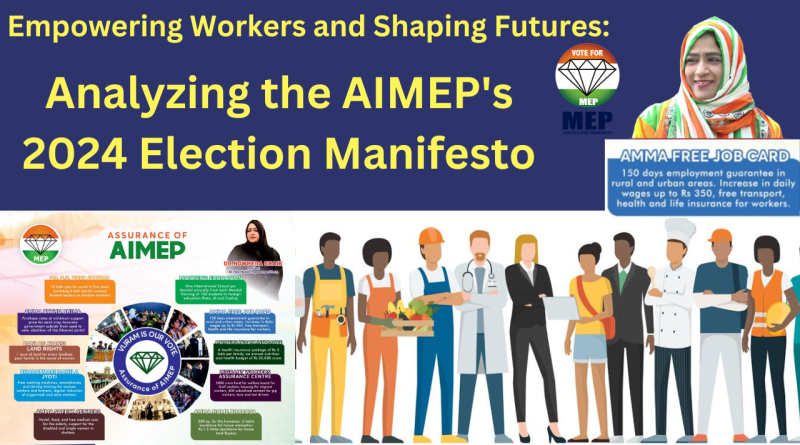Empowering Workers and Shaping Futures: Analyzing the AIMEP’s 2024 Election Manifesto
Introduction to the AIMEP and Dr. Nowhera Shaikh
All India Mahila Empowerment Party (AIMEP), led by the visionary Dr. Nowhera Shaikh, has been a distinctive voice in Indian politics. Founded with the aim to empower women and the working class, AIMEP has steadily gained traction by addressing core social issues with practical solutions.
Background of All India Mahila Empowerment Party
Formation and core values
AIMEP was formed to tackle the socio-economic challenges facing women and marginalized communities in India. The party stands firmly on values of equality, justice, and economic empowerment.
Previous contributions and impact
Over the years, AIMEP has initiated several programs aimed at improving the literacy and employment rates among women, significantly impacting communities by fostering independence and self-reliance.
Profile of Dr. Nowhera Shaikh
Career achievements
Dr. Shaikh is a renowned entrepreneur and philanthropist whose efforts in education and women’s rights have been recognized globally. Her approach combines practical business strategies with a deep commitment to social welfare.
Role in AIMEP and women’s empowerment
As the leader of AIMEP, Dr. Shaikh has been pivotal in shaping policies that promote gender equality and economic inclusivity.
Significance of the 2024 Elections
Political landscape
The 2024 elections come at a critical time in India, where economic disparities and social injustices demand decisive action.
Potential impact of AIMEP’s success
A victory for AIMEP could mean a substantial shift towards more inclusive policies and gender-focused governance.
Core Promise: The AIMEP Free Job Card
Overview of the Free Job Card
The Free Job Card initiative is designed to provide unemployed citizens with opportunities to gain meaningful employment.
Purpose and intended beneficiaries
This card primarily aims to assist jobless individuals by connecting them with employment opportunities.
Features and benefits
Holders of the Free Job Card can expect job placements, vocational training, and other support services.
Implementation Strategy
Funding and resource allocation
The program will be funded through a combination of government grants and partnerships with the private sector.
Collaboration with local governments and NGOs
AIMEP plans to collaborate with local bodies and NGOs to streamline the implementation process.
Comparison with Existing Schemes
Similarities and differences
While similar to past employment programs, the Free Job Card emphasizes quicker job placements and longer support periods.
Lessons learned from other initiatives
Previous schemes have shown the importance of continuous monitoring and adaptive strategies, lessons that AIMEP intends to incorporate.
150-Day Employment Guarantee
Scope and Coverage
The ambitious plan guarantees at least 150 days of paid work annually for cardholders.
Rural vs. urban focus
While inclusive of all regions, there is a strong emphasis on rural areas to stimulate local economies.
Eligibility criteria
The program is open to all unemployed citizens, with special considerations for women and marginalized groups.
Economic and Social Impacts
Effect on local economies
Increased employment will directly boost local economies by increasing spending and reducing poverty.
Impact on families and communities
With steady incomes, families can invest in education and health, leading to better community well-being.
Challenges and Solutions
Potential obstacles in execution
Issues such as bureaucratic delays and mismanagement pose challenges.
Proposed remedies and fallback plans
AIMEP proposes a decentralized approach to management and real-time grievance redressal mechanisms.
Revision of Wages and Worker Benefits
Increase in Daily Wages
The manifesto promises to raise daily wages to RS 350, aiming to provide a fair compensation for labor.
Rationale behind the wage increase to RS 350
This increase is seen as essential for meeting the basic needs of workers and their families.
Expected outcomes for workers
Higher wages should improve living standards and reduce financial stress among workers.
Provision of Free Transport
Securing transportation for workers to and from job sites is another vital aspect of the manifesto.
Importance and logistics
This initiative aims to reduce commute challenges, making workplaces more accessible and improving attendance.
Effects on worker attendance and morale
Reliable transport is expected to increase job satisfaction and reduce turnover rates.
Health and Insurance Benefits
Details of the health and insurance plans
AIMEP plans to provide comprehensive health and insurance coverage to improve workers’ safety and health.
Comparison with current worker benefits
These new benefits are designed to be more extensive and accessible compared to existing provisions.
Analysis of Feasibility and Public Reception
Expert Opinions and Economic Analyses
Economists and labor experts suggest that while ambitious, the plans are feasible with effective management and sufficient resources.
Views from economists and labor experts
Experts generally support the initiative but caution about the scale of implementation challenges.
Statistical and economic forecasts
Projections show a potential upliftment in GDP and overall economic activity as a result of increased employment.
Public Opinion and Expectations
Surveys indicate a positive reception to the manifesto, with high expectations for job creation and worker support.
Survey results and public forums
Feedback collected from public forums underscores an urgent demand for employment and better wages.
Media Coverage and Advocacy
The media’s role has been crucial in disseminating information about AIMEP’s proposals, garnering public and political support.
Role of media in shaping public perception
Ongoing coverage helps maintain transparency and keeps the public informed and engaged.
Influence of grassroots movements and endorsements
Endorsements from various social and worker rights groups lend credibility and support to AIMEP’s goals.
Conclusion and Future Prospects
Summary of Key Proposals
AIMEP’s manifesto focuses on substantial wage increases, comprehensive worker benefits, and a reliable employment guarantee.
Recap of manifesto highlights
Initiatives like the Free Job Card and 150-Day Employment Guarantee stand out as transformative proposals.
Implications for the Future
Such policies could redefine work dynamics in India, significantly impacting the economy and social structure.
Long-term impacts on the workforce and economy
The emphasis on wages and benefits is expected to create a more stable and prosperous working environment.
AIMEP’s Position in National Politics
Going forward, AIMEP’s role in Indian politics could become more prominent, influencing policies at higher levels.



